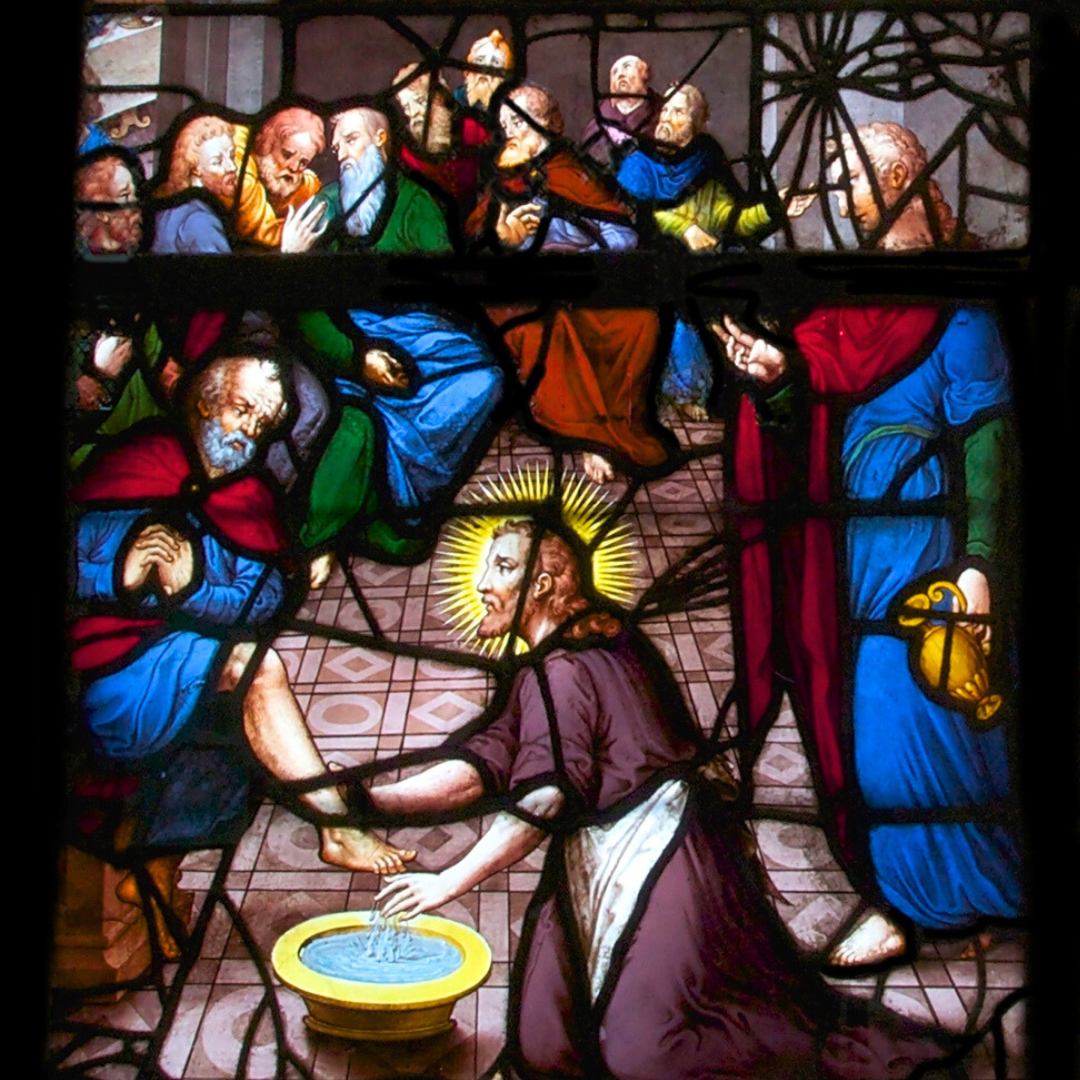
On Holy Thursday, Lindsey Mitzel contemplates the many ways moms wash the feet of the ones they love.
I pick up a bare little foot, hold it close to my nose, and gasp in mock surprise, “Uggh! Stinky feet!” My one-and-a-half-year-old erupts rapturously into giggles. It’s her favorite game. Later, it’s bathtime. I lift a bigger foot to scrub clean. “Careful of my toe,” my preschooler implores. He has a healing injury. When I think about feet in my life, I think about the countless dirty socks I find strewn across the floor and tucked into crevices in the car. Sandy socks, muddy socks, smelly socks, size 6 months to 10.5 men’s socks are lost and found, washed, and lost again all over my house. I don’t prefer socks. I have kids like that, too. We tromp around the house feeling the grit the dog tracks in before it’s swept up again.
As a kid, I never understood my mom’s vexation about cleaning the house just to have it instantly muddied. I understand more now. The sweeping, vacuuming, and mopping seems endless. A trip outside after rain means muddy boots left on the step, dirty feet washed in the sink, wet prints on the floor, muddy footprints on the floor from the boots which weren’t left outside, and more laundry to wash. I have a mudroom, and it has earned its name well.

This Holy Thursday, we remember Jesus’ example of washing his disciples’ feet. John 13 tells us that Jesus rose from supper and laid aside his garments, girding himself with a towel. He begins to wash his disciples’ feet (John 13:4). Afterwards, he takes his garments and resumes his place.
So when he had washed their feet [and] put his garments back on and reclined at table again, he said to them, “Do you realize what I have done for you? You call me ‘teacher’ and ‘master,’ and rightly so, for indeed I am. If I, therefore, the master and teacher, have washed your feet, you ought to wash one another’s feet. I have given you a model to follow, so that as I have done for you, you should also do." (John 13:12-15)
In Jesus’ time, feet were not just muddy. We’re generally used to having a sanitation system involving sewers and streets that aren’t covered with excrement. I’m imagining walking through my barnyard growing up and having to dodge small piles of manure all over the place. Once when I was younger our septic field backed up. The yard was quite unpleasant until it was repaired, and one needed to watch their step, if you know what I mean. Honestly, I’ve struggled with connecting with this story. Cleaning feet, no matter how gross seems kind of natural—what mom hasn’t cleaned spilled food off feet or dog poop off shoes? Goodness, potty training hasn’t always been smooth sailing.

As I think about it, there are so many ways I care for feet in my life. Soft little baby feet are covered in booties. Toddlers sit on my lap while I wrestle on shoes. Preschoolers sit on chairs as I help them slip on sandals. My older children show me their worn-out shoes, a size too small and hold up feet to be measured for a new pair. I clip toenails. I paint toenails. I rub my husband’s sore feet after a long day at work. In all these moments, I notice my posture is one of sitting or being lower.
As Jesus is depicted as lower than His disciples while washing their feet, in each moment I embrace service, I accept being lower as well. Sometimes I embrace humility. However, when I’m struggling, hurt, or frustrated, I usually want to run and hide. In these moments, I could choose to serve despite the lack of appreciation, affirmation, or return—or I could serve myself. These are moments to dig deep and love more. So often I choose the easier path.
In John 13:7 Jesus says, “What I am doing, you do not understand now, but you will understand later.” In verse 12 Jesus states, “Do you realize what I have done for you?” The disciples eventually recognize that Jesus had washed all their feet, including Judas Iscariot’s—a man who received Jesus and then got up and betrayed him. St. Paul would later write, “For God proves his love for us in that while we were still sinners Christ died for us” (Romans 5:8).

In His selfless gift of life through the loss of His, Jesus exemplifies incredible humility. His example to us is loving and serving those who cause us pain and actively hurt us. Who can I serve whom I would rather avoid? Who can I reach out to in love who has hurt me? How can I love to the end, even if it feels undeserved or underappreciated?
Share your thoughts with the Catholic Mom community! You'll find the comment box below the author's bio and list of recommended articles.
Copyright 2024 Lindsey Mitzel
Images: (bottom) Jebulon, CC0, via Wikimedia Commons; all others Canva
About the Author

Lindsey Mitzel
Lindsey Mitzel is a nurse practitioner and mom to six littles. When not homeschooling or driving her kids to various places, she enjoys gardening, hiking, and running. Lindsey appreciates dry humor, a good pun, and coffee. You can read more about her at Eight and a Half Months. Lindsey also occasionally writes for Be Love Revolution's Tiny Thoughts blog.


.png?width=1806&height=731&name=CatholicMom_hcfm_logo1_pos_871c_2728c%20(002).png)
Comments